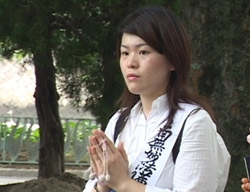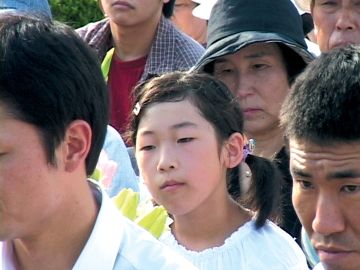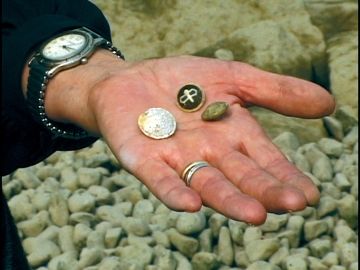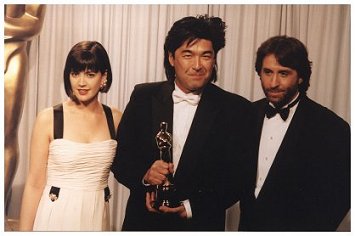A Note of Triumph: The Golden Age of Norman Corwin God Sleeps in Rwanda The Death of Kevin Carter

Director: Steven Okazaki
Japan/USA, 2005, 35 minutes, in English and Japanese
SYNOPSIS
As nuclear weapons situations in North Korea and Iran escalate, THE MUSHROOM CLUB offers a timely look at the consequences of the atomic bomb that was dropped on Hiroshima, Japan, on Aug. 6, 1945. It is a reminder of the destructive legacy of war and a plea for more thoughtful engagement.
THE MUSHROOM CLUB is a journey to Hiroshima, sixty years after the bomb. Academy Award-winning filmmaker Steven Okazaki, who first visited the city in 1980, takes a very personal look at Hiroshima - the place, the people, the historical event, the idea. It is a compelling collection of everyday images - a class photo, a spool of thread, a handful of buttons - and the powerful stories that come with them. Okazaki decided to make the film in 1995 when he observed that the 50th anniversary of the bombing came and went with little media coverage. He wanted to point out how history is written and how easily it can be forgotten.

Commemorations are for survivors, those who were there or at least living when the hardships of note took place. But what do they mean to twenty-, thirty-, and even forty-somethings unconnected to that distant past? What happens when the few remaining survivors die out or move on and people start to forget?
THE MUSHROOM CLUB aptly addresses the struggle of remembering in its interviews with "hibakusha" - atomic bomb survivors. The oldest was a 25 year old newlywed and the youngest weren't born yet when the atomic bomb was dropped on August 6, 1945. On that day, all of their lives were unalterably changed, beyond what most of us can imagine.
Best friends Narumi and Toshiko, in-utero at the time of the blast, were born with microcephaly and have the mental capacity of small children. Both are members of Kinoko Kai, the Mushroom Club, an organization formed by journalist Minoru Ohmuta for "children of the bomb." They are the nation's in-betweeners, those born at the border between prewar and postwar Japan, who've been permanently affected by the bomb without having experienced it themselves.
Comic book artist Keiji Nakazawa has devoted his life to telling the Hiroshima story through anime. Nakazawa, then six years old, lost his father, brother and sister in the bombing.

Eighty-five-year-old Toshiko Saiki preserves the souls of the dead by collecting old buttons that wash up near the river, where scores of Japanese perished soon after the bombing. Yoshiko Kajiyama, four years old then, clutches a spool of red thread, the only thing she has to remember her mother by.
Yuriko Hatanaka was three months in-utero when her mother witnessed the bomb. She is now 59 years old but has the mental capacity of a two year old. She was diagnosed as microcephalic, but it took thirty years for Japanese and American scientists to admit to her parents that her mental and physical disabilities are caused by radiation exposure.
Today, as Ohmuta says at the end of THE MUSHROOM CLUB, "Japan is at a turning point," and the few who do remember Hiroshima and Nagasaki are worried the events will soon slip away into a forgotten past.
The Japanese, and indeed the world's memory of Hiroshima is under the threat of time. Filmmaker Okazaki sends an important message: We must never forget. We are our history, for better or for worse.
FROM THE DIRECTOR [Back to Top]
"Hiroshima is full of remarkable people and stories," says Okazaki, who has visited Hiroshima numerous times over the past twenty-five years. He decided to make this film in 1995 when the fiftieth anniversary of the bombing came and went with minimal media coverage.
"In Hiroshima, there was a lot of anticipation around the fiftieth anniversary. People thought that the Hiroshima story would finally be heard around the world. Then it came and nothing happened. The American news shows mumbled something about 'today is the fiftieth anniversary' and that was it. The people in Hiroshima, the peace movement in Japan, went kind of numb after that and still hasn't recovered," said Okazaki.
"The Enola Gay, the airplane that dropped the bomb is on exhibit in the new Smithsonian National Air and Space Museum and there is no mention of radiation or of the people dying, because it is still too controversial to admit to the extraordinary human suffering caused by one bomb. It's a lesson in how history gets written.
"It's distressing, this process of remembering and how you have to keep doing it. You think, 'Geez, do I really have to do this every time there's a new generation?' ... But yeah, you have to keep reminding people of what happened."
ABOUT THE FILMMAKER [Back to Top]
Steven Okazaki THE MUSHROOM CLUB is the third Okazaki film to be nominated for an Oscar, and is yet another benchmark in a career spanning over 25 years encompassing more than a dozen films and recognized by numerous awards (including an Oscar and a Peabody). Steven Okazaki is one of the most celebrated and prolific documentary filmmakers working today. His body of work is a cornerstone of Asian American cinema, unparalleled in its depth, influence and impact, and pioneering in bringing untold stories to the screen.
Okazaki has shown a particular interest in looking at the human side of dramatic historic events and troubling social issues. Segments from his films have been featured on "The CBS Evening News," "The NBC Nightly News," ABC News "Nightline," CNN and "Oprah." Historical PBS documentaries, children's films, gritty HBO-funded cinema-vérité works, and Sundance-hit independent feature narratives: Steven Okazaki's career has been one of remarkable range and accomplishments.
Steven started his career in 1976, producing children's films about racism for Churchill Films. His short documentary, A-M-E-R-I-C-A-N-S, was broadcast on CBS in 1977 and his short drama, A LITTLE JOKE, was awarded Instructor Magazine's "Best Educational Film" in 1978. Okazaki's first feature documentary, SURVIVORS, was produced for WGBH in 1982, aired on PBS, and gave voice to Hiroshima and Nagasaki atomic bomb survivors, laying the foundation for his groundbreaking collection of work exploring Japanese American history. He was nominated for an Academy Award in 1985 for UNFINISHED BUSINESS, which chronicled the challenge to the internment of Japanese Americans during WWII. With a fellowship from the American Film Institute, Steven moved in a different direction with LIVING ON TOKYO TIME, a no-budget comedy about a Japanese dishwasher and her deadbeat husband. This narrative feature premiered at Sundance in 1987 and became a cult favorite.
Okazaki won an Oscar and a Peabody in 1991 for DAYS OF WAITING, the story of artist Estelle Ishigo, one of the few Caucasians to be interned Japanese Americans during WWII. In 1992, he produced TROUBLED PARADISE for PBS, which looks at native Hawaiian activism. In 1993, he made HUNTING TIGERS, a comic look at Tokyo pop culture featuring Nobel Prize-winning novelist Kenzaburo Oe. In 1994, he directed AMERICAN SONS, which examines how the lives of Asian American men are shaped by racism.
Over the past decade, Okazaki has shifted his focus to people and lives torn apart by AIDS and drug abuse. His short film ALONE TOGETHER: YOUNG ADULTS LIVING WITH HIV was honored with an UNESCO Award in 1995, and the critically lauded cinema-vérité BLACK TAR HEROIN: THE DARK END OF THE STREET was nominated for an Emmy in 1999.
Steven Okazaki was born in Venice California and is a 1976 graduate of San Francisco State University. He is married to author-journalist Peggy Orenstein and they live in Berkeley.

A-m-e-r-i-c-a-n-s (1976)
A Little Joke (1978)
Survivors (1982)
Unfinished Business (1985)
Living On Tokyo Time (1987)
Hunting Tigers (1988)
Days of Waiting (1990)
Troubled Paradise (1992)
The Lisa Theory (1993)
American Sons (1994)
Alone Together: Young Adults Living with HIV (1995)
Life The Dark Side of the Street (1999)
The Mushroom Club (2005)
Rehab (2005)
AWARDS & FESTIVAL SCREENINGS [Back to Top]
Academy Award (Oscar) Nominee for Best Documentary Short 2005;
Underdog Film Festival;
San Francisco International Asian American Film Festival;
Trenton Film Festival;
American Cinematheque at the Egyptian
International Documentary Association DocuDays, Beverly Hills;
Documentary Short Subject Program, The National Archives, Washington D.C.;
River Run International Film Festival, Winston-Salem;